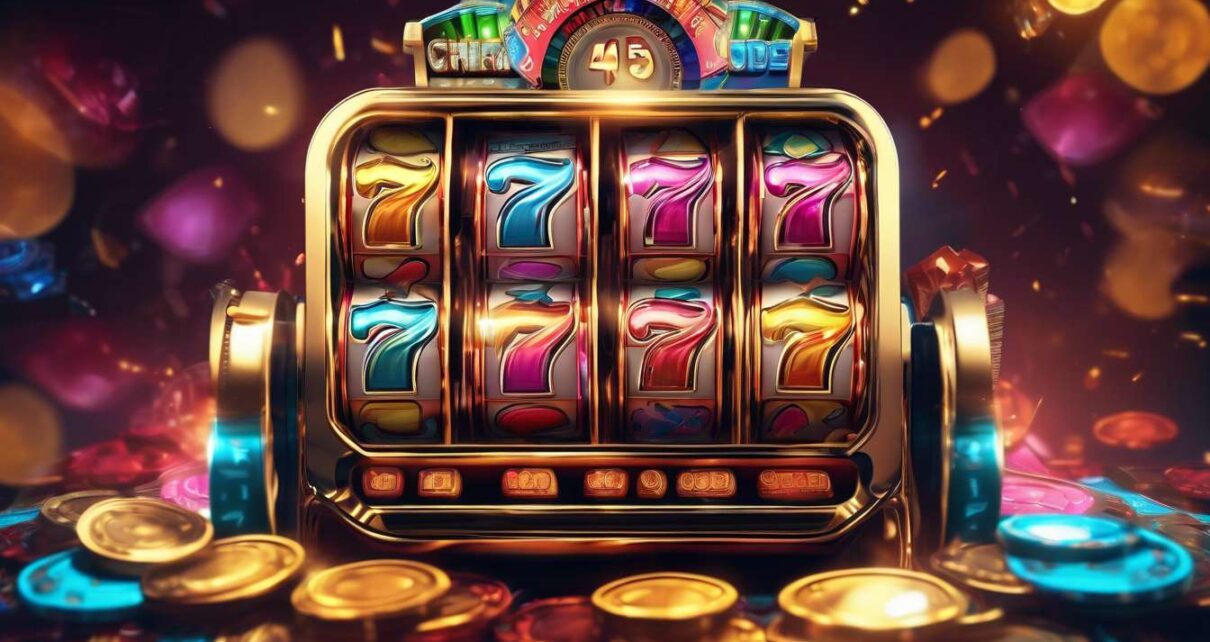As avid enthusiasts and players of slot games, we often find ourselves questioning the fairness of these vibrant and captivating games we love. It’s a common curiosity that arises each time we spin the reels and anticipate a win.
In our quest to understand what truly makes a slot game “fair,” we have delved into the mechanics and regulations that govern these digital marvels. Our aim is to shed light on the key considerations that ensure every player has a fair shot at winning.
By exploring elements such as:
- Random Number Generators (RNGs)
- Return to Player (RTP) percentages
- Licensing requirements
we can better understand how fairness is maintained across different slot games.
We believe that by gaining insight into these aspects, we can enhance our gaming experience and make informed choices. Join us as we unravel the intricacies of slot game fairness, ensuring that our gaming adventures are both enjoyable and equitable.
The Role of RNGs
At the heart of any fair slot game is the Random Number Generator (RNG), ensuring each spin’s outcome is genuinely unpredictable. RNGs are essential for fostering a gaming community where fairness and trust are paramount. These sophisticated algorithms ensure that:
- Each game round is a new adventure.
- Results are independent of previous spins.
- A level playing field is maintained.
To further guarantee fairness, reputable game developers undergo rigorous licensing processes. Licensing authorities play a crucial role by:
- Scrutinizing games to ensure RNGs function correctly.
- Providing confidence in the accuracy and reliability of the game’s RTP (Return to Player) percentages.
By relying on RNGs and adhering to licensing standards, game developers create an environment of assurance. This commitment ensures that:
- We can enjoy slot games with peace of mind.
- Every spin is as fair as the last.
It’s a shared assurance that enhances the gaming experience for us all.
Understanding RTP Percentages
When we dive into the world of slot games, understanding the significance of Return to Player (RTP) percentages becomes crucial for making informed choices. As a community of gaming enthusiasts, we want to ensure that every spin is not just thrilling but also fair.
RTP percentages reveal the average amount a slot game returns to players over time. For instance, a game with an RTP of 96% should theoretically return $96 for every $100 wagered, creating a sense of trust and transparency.
RNGs (Random Number Generators) work hand in hand with RTP to ensure unpredictable and fair outcomes. These algorithms guarantee that each spin is independent, fostering a level playing field for everyone involved. It’s essential for us to seek games that balance high RTP with robust RNGs.
Moreover, examining a game’s licensing can further assure us of its fairness.
- Reputable licensing bodies verify both RTP and RNG compliance, providing us with a secure gaming environment.
Let’s embrace this knowledge and spin wisely!
Importance of Licensing
Ensuring a Slot Game’s Fairness
Ensuring a slot game’s fairness often starts with checking its licensing from reputable authorities. When a game is licensed, it reassures us that the game adheres to strict standards, including the integrity of its RNGs (Random Number Generators) and the accuracy of its RTP (Return to Player) percentages.
Reputable Licensing Bodies
Licensing bodies, like:
- Malta Gaming Authority
- UK Gambling Commission
These organizations ensure that games are not only fun but also fair and transparent.
Benefits of Licensed Games
By sticking with licensed games, we:
- Join a community that values trust and security.
- Know we’re getting a fair shake because these licenses require games to be audited regularly, ensuring their RNGs produce genuinely random results.
This transparency fosters a sense of belonging among players, knowing we’re all playing on a level field.
Importance of Licensing
Licensing is our first line of defense against unfair practices, and it’s a vital component in maintaining the fairness we all seek in our gaming experiences.
Fair Play Testing Procedures
To ensure slot games are fair, independent agencies rigorously test them to verify the randomness of outcomes and the accuracy of payout percentages. Knowing that games are tested by experts provides peace of mind, allowing players to enjoy the games without worry.
These agencies focus on:
- Random Number Generators (RNGs): Ensuring each spin is unpredictable and unbiased.
- Return to Player (RTP) figures: Confirming that the games pay out as promised over time.
Licensing authorities mandate these tests, which means players are protected by standards that promote fairness. When a game passes these tests, it earns a certification that players can trust.
This rigorous testing builds a sense of belonging and trust within the gaming community, knowing that fair play is valued. By choosing licensed games, players support an industry that prioritizes integrity, making the gaming experience both enjoyable and secure.
Impact of Game Volatility
Game Volatility and Player Experience
Game volatility significantly influences the player’s experience by determining the frequency and size of payouts. When we play, we often seek a balance between:
- High volatility games: Offer larger but less frequent wins.
- Low volatility games: Provide smaller, more consistent payouts.
Understanding this balance is vital for us to find games that match our risk appetite and play style, creating a sense of belonging in a community of like-minded players.
Role of RNGs and RTP
RNGs (Random Number Generators) ensure fair outcomes, and when combined with a slot’s volatility, they shape our gaming experience.
- Higher volatility games can be thrilling but might test our patience.
- Lower volatility games offer steady excitement.
RTP (Return to Player) complements volatility by indicating the average payout over time, helping us make informed choices.
Importance of Licensing
Licensing plays a crucial role in maintaining fairness. Reputable licenses assure us that the game’s volatility and other elements, like RNGs and RTP, are regularly tested and upheld, fostering trust.
Player Protection Measures
To ensure our gaming experience remains enjoyable and safe, it’s essential for us to understand the various player protection measures implemented by casinos and game developers.
Random Number Generators (RNGs)
- RNGs ensure each spin’s outcome is unpredictable, keeping the game fair and exciting for all players.
- They are regularly tested by independent bodies to maintain fairness.
Return to Player (RTP) Percentages
- RTP percentages provide us with an idea of the potential returns over time.
- They help us make informed choices about where to spend our time and money.
- Always check the RTP to ensure we’re playing games with reasonable odds.
Licensing
- Licensing is a fundamental aspect of player protection.
- Reputable regulatory bodies require stringent adherence to fairness and safety standards.
- By choosing licensed casinos and games, we join a community that values integrity and trust, enhancing our overall gaming experience.
Understanding these concepts will help ensure a safe and enjoyable gaming environment.
Transparency in Game Design
In our pursuit of fair gaming, understanding transparency in game design is crucial.
This ensures that the mechanics and outcomes are as the developers intend.
- It’s essential to see how Random Number Generators (RNGs) operate, ensuring that each spin is genuinely random.
- This knowledge reinforces our belief in a fair gaming environment, where no hidden forces manipulate outcomes.
Furthermore, clarity on RTP (Return to Player) percentages is necessary.
- When developers disclose the RTP, we can make informed choices and feel empowered.
- Knowing that over time, the game returns a specific percentage of wagers strengthens our confidence in the game’s fairness.
Licensing also plays a crucial role.
- By choosing games from developers with reputable licenses, we know they adhere to strict regulations.
- This shared understanding fosters a sense of belonging within our community, as we all seek assurance that the games we play are both secure and fair.
Responsible Gaming Practices
In our commitment to fair gaming, we must prioritize responsible gaming practices to ensure a safe and enjoyable experience for everyone. We understand that a sense of community and trust is built when players feel protected.
That’s why we focus on implementing robust measures:
- Random Number Generators (RNGs)
- Guarantee game outcomes are unpredictable and fair.
- When properly employed and regularly tested, they enhance our credibility and the players’ confidence.
Moreover, we emphasize the importance of Return to Player (RTP) rates.
- By transparently displaying RTP percentages, we empower players to make informed decisions.
- This fosters a sense of belonging and fairness in our gaming community.
We also ensure that every game we offer complies with licensing requirements.
- This commitment to licensing not only upholds legal standards but also reassures players that they’re participating in a regulated and secure environment.
Together, these practices establish a foundation where fairness and responsibility are at the core of our gaming experience.
How do slot games compare to other types of casino games in terms of fairness?
When it comes to fairness, slot games differ from other casino games in their reliance on random number generators (RNGs). These RNGs ensure outcomes are truly unpredictable.
While some may prefer the strategic element in games like poker or blackjack, slot games offer a sense of chance and excitement.
Each game type has its own appeal, but the randomness of slot games adds an extra layer of thrill that sets them apart.
Are online slot games more or less fair than physical slot machines found in casinos?
Fairness in Slot Games
We find that online slot games tend to offer a similar level of fairness as physical slot machines in casinos. Both platforms operate based on random number generators to determine outcomes, ensuring a level playing field for all players.
Online vs. Physical Slot Machines
- Online slots undergo rigorous testing and regulation to maintain fairness.
- Some may argue that physical machines feel more tangible.
Conclusion
Ultimately, the choice between online and physical slots often comes down to personal preference and convenience.
Can players influence the outcome of a slot game through skill or strategy?
Belief in Influence through Skill or Strategy
Yes, we believe that players can influence the outcome of a slot game through skill or strategy. While luck plays a significant role in slot games, our decisions and actions can certainly impact the overall gameplay experience.
Improving Chances with Game Mechanics and Strategy
- Understand game mechanics: By gaining a deep understanding of how the game works, players can make more informed decisions.
- Set betting limits: This helps in managing bankroll effectively and ensures a longer gameplay duration.
- Practice responsible gaming habits: Being mindful of one’s gaming habits can prevent excessive losses and enhance the overall experience.
Enhancing Gameplay
With practice and knowledge, players can enhance their gameplay. This approach not only improves the overall experience but can also potentially increase winnings.
Conclusion
In conclusion, ensuring a slot game is "fair" involves various key considerations. Each aspect plays a crucial role in maintaining fairness:
-
Use of RNGs: Random Number Generators are fundamental in ensuring that game outcomes are unpredictable and unbiased.
-
Player Protection Measures: These measures ensure that players are safeguarded against potential exploitation or unfair practices.
-
Game Volatility: Understanding the impact of volatility is essential for creating a balanced and enjoyable gaming experience.
-
Responsible Gaming Practices: Implementing these practices helps maintain an equitable gaming environment and supports player well-being.
By prioritizing:
- Transparency in game design
- Adhering to fair play testing procedures
players can trust that the game is operating fairly and ethically.



